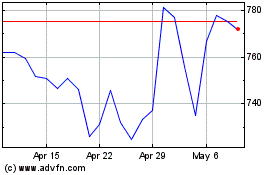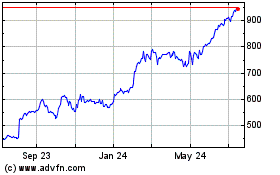Eli Lilly to Cut 8% of Global Workforce, or 3,500 Jobs
September 07 2017 - 9:45AM
Dow Jones News
By Peter Loftus
Eli Lilly & Co. plans to cut its global workforce by about
8% and close several facilities, a step it said it needs to make to
lower costs and raise investment in new drugs as the company faces
patent expirations that will erode sales of older products.
The Indianapolis company, which makes the diabetes treatment
Humalog and erectile-dysfunction pill Cialis, said Thursday it
plans to eliminate about 3,500 positions globally, with about 2,000
of the cuts in the U.S. The jobs will be spread across various
areas including manufacturing and research.
Lilly said it expects to achieve most of the U.S. reductions
through voluntary early-retirement packages offered to eligible
employees. Other job cuts will come from site closures and layoffs,
it said. Lilly has about 41,241 workers globally, including more
than 18,500 in the U.S.
Lilly expects the moves to generate savings of about $500
million a year. Last year, Lilly earned $2.7 billion in net income
on $21.2 billion in revenue. About half the projected savings will
go toward supporting new product launches and clinical development
of new uses for its drugs, Lilly said.
"We would like to free up resources from fixed to variable costs
to make sure we can invest behind R&D projects," Lilly Chief
Executive David Ricks said in an interview.
Big drug companies have been cutting their workforces
periodically for more than a decade, as they face generic
competition to their top-selling medicines and troubles developing
new drugs. In 2013, Merck & Co. announced a plan to cuts its
workforce, then at 81,000, by 20% over two years. In 2013, Lilly
laid off about 1,000 sales representatives.
The job cuts come despite a general improvement in Lilly's
financial fortunes over the past few years. Earlier this decade,
Lilly's sales and earnings were hurt by a wave of patent losses
that exposed drugs such as the antidepressant Cymbalta to generic
competition.
But revenue and earnings have risen since 2014 following rising
sales of several newer products such as diabetes drug Trulicity and
cancer treatment Cyramza. Lilly's share price has roughly doubled
since 2012, closing Wednesday at $80.51.
Still, Lilly continues to face patent expirations. In May, the
U.S. patent expired for the attention-deficit/hyperactivity
disorder drug Strattera, clearing the way for inexpensive generic
copies. The U.S. patent for Cialis is due to expire in November,
putting the drug's $1.5 billion in annual U.S. sales at risk of
erosion from generics.
Mr. Ricks, who took over as Lilly CEO Jan. 1, said he still
expects Lilly's sales to grow despite the patent losses, but the
expirations contributed to his decision to cut costs.
Also, he said Lilly's operating expenses as a percentage of
revenue -- about 55% in 2016 -- have been higher than the drug
industry's average, and the cost cuts will make the company more
competitive with rivals. Lilly expects operating margins to fall
below 50% next year.
"Our job is to do the right thing for our company," Mr. Ricks
said. Noting that many of the cuts would be through
voluntary-retirement packages, he added: "We're not throwing people
out on the street."
The job cuts also come at a delicate time in the pharmaceutical
industry's relationship with U.S. President Donald Trump, who has
criticized drug companies for charging high prices and
manufacturing drugs outside the U.S. He has urged the industry to
move more manufacturing jobs back to the U.S., and has said he
would take steps to bring down prices.
Mr. Ricks was among several CEOs who met with Mr. Trump at the
White House in January, when he told Mr. Trump that Lilly still
makes many of its products in Indiana and the U.S. "In fact, we're
hiring manufacturing jobs as I speak," he said at the time.
Lilly said it plans to close a research-and-development site in
Bridgewater, N.J., and to move production of certain animal drugs
from a plant in Larchwood, Iowa, to another plant in Fort Dodge,
Iowa. Also, Lilly plans to close an R&D site in Shanghai,
China.
Lilly expects to book charges of about $1.2 billion, or 80 cents
a share, in the third and fourth quarters of 2017 to cover the
costs of the job cuts, including the early-retirement packages and
severance pay.
Write to Peter Loftus at peter.loftus@wsj.com
(END) Dow Jones Newswires
September 07, 2017 09:30 ET (13:30 GMT)
Copyright (c) 2017 Dow Jones & Company, Inc.
Eli Lilly (NYSE:LLY)
Historical Stock Chart
From Mar 2024 to Apr 2024

Eli Lilly (NYSE:LLY)
Historical Stock Chart
From Apr 2023 to Apr 2024
